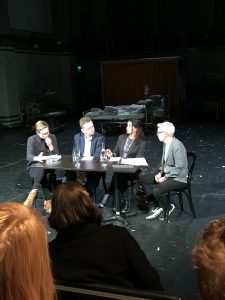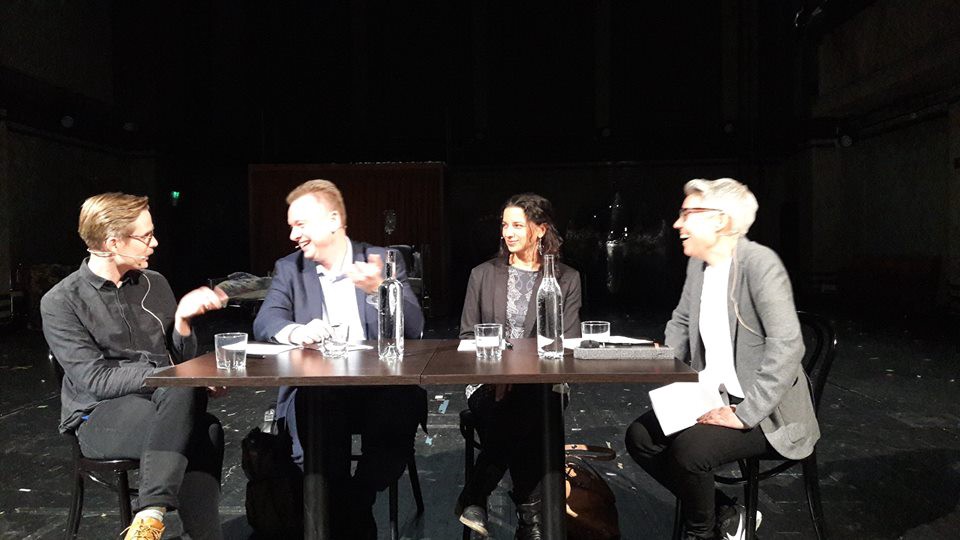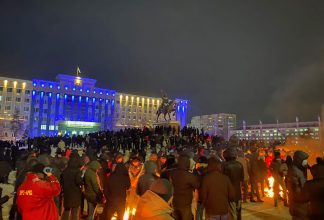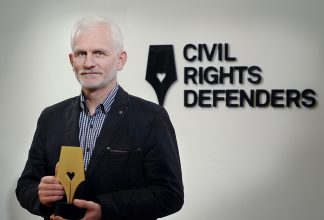Hope Amidst a Global Backlash on LGBTQ+ Rights
Late on Monday evening, the sun already below the horizon in wintery Stockholm, a group of people gathered at the Royal Dramatic Theater, to visit a seminar on LGBTQ+* rights.
The location had been chosen with care due to the fact that the renowned play Angels in America is performed here, the Pulitzer Prize and Tony Award winning story of norm breaking people living in New York under the Reagan administration and the rapid spread of AIDS in the 1980’s. The play is for the first time being shown on a Swedish stage. Posters with slogans, bright colours, and norm breaking pictures covered the walls of the room adjacent to the auditorium, subtly setting the mood for the spectators of LGBTQ+ Rights under Attack — a Global Outlook. The seminar was organised by the Swedish Institute of International Affairs (UI), with the financial support from the Swedish International Development Cooperation Agency (SIDA) through Forum Syd.

Entering the room, the audience was met by a big dark room, where beds, a fountain, and an enormous disco ball creates a brooding backdrop. Sitting in front of the audience, lit up by fierce strobe lights, the three panelists and the moderator Anna-Maria Sörberg set the scene. To Anna-Maria’s left we had Neela Ghoshal, senior researcher at the LGBT Rights Program at Human Rights Watch and newly returned from a trip to the US. Next to her is Goran Miletic, director for Europe at Civil Rights Defenders, who is usually working out of our Europe office in Belgrade, Serbia. At the far end, concluding the panel, was Emil Edenborg, Research Fellow at UI, who is currently analysing Russia’s role in furthering a global trend of traditional values.
Turning first to Neela Ghoshal, moderator Anna-Maria Sörberg mentioned Neela’s recent return to Sweden from the US, bringing up the topic of Trump and his regime’s recent setbacks and revocation of LGBTQ+ rights. Neela agreed that progress on the rights of LGBTQ+ people has been stalled, and that there is a mindset of “holding one’s ground”, meaning focusing on defence against repressive attacks leaving little time over for forward-looking agendas. On the question whether this is a global backlash, Goran Miletic responded that one always has to bear in mind the regional context and the political reality when discussing LGBTQ+ rights, pointing out the differences within Europe alone. Emil Edenborg agreed with Goran about the importance of taking regional context into account, but that a pattern of increased repression is also visible across the globe. He added that LGBTQ+ rights are glued to other issues, symbolic and imaginary threats, and are used as a means for authorities to justify civil society interventions.
Neela picked up on Emil’s train of thought and emphasized how regimes frame their crackdowns as defending traditional values, such as “protection of the family”. Goran countered by asking what one means by traditional values, sexuality has always been taboo. According to Emil, the use of such a taboo topic as sexuality in politics is common, and the way it has been used has changed over time. Emil brought forth the idea of sexuality in politics as increasingly connected to geopolitical markers, that regime crackdowns are a way to assert non-Westerness. In this scenario, LGBTQ+ people are hostages of greater global political forces. However, Neela opposes the view that LGBTQ+ rights and issues are a Western phenomena and refers to Latin America, a non-Western region who has been seen as being in the foreground, especially concerning transgender rights. An encouraging break from the Global North / Global South dichotomy.

Towards the end of the seminar Anna-Maria posed an important question: What do we want to see more of, and what can be done to reverse this trend? Goran was quick to mention support to activists working in the field, noting that they are not that many and that showing support is a good and important way to share encouragement. Goran also added that funding has lately been redirected from LGBTQ+ issues to deal with other political matters, such as the influx of refugees in Europe. Emil concurred, saying support to local grassroot organisations is crucial, but that asylum policies on receiving refugees based on sexual orientation also needs attention. Neela drew on his argument, saying that countries should make sure that the rest of their legislation and policy match their LGBTQ+ framework. Emil got the final word, concluding that since the movement and backlash is global, the resistance has to be global too.
After the seminar, we spoke directly with Neela, asking if the backlash on LGBTQ+ rights have been good or bad for innovation in the field? Neela painted a picture of hope, saying that there is real potential for a civil society resurgence. Citing Kenya as an encouraging example where at the moment LGBTQ+ advocates are pushing forward several cases in court, showing that it is still possible for steady progress in the midst of what is called a global backlash. However, there are examples of when the repressive trend really have forced activists to “go underground”, facing crackdown and violence if daring to publicly stand up for LGBTQ+ people and their rights. Here Neela mentioned Egypt in particular, saying that since Egyptian LGBTQ+ activists are not able to operate in the same way as before, they have to rethink their strategy if they want to continue their advocacy work. And so they have. The internet has become their gateway, using it to among other things continue to publish reports on the topic. Furthermore, they have had to become adept in using social media channels.
At Civil Rights Defenders we partner with advocates of LGBTQ-rights, since it is important that people identifying as LGBTQ+ have the same rights as anyone else. We support LGBTQ+ organisations through capacity building and through facilitating their participation in public events, as well as providing training in security and project management. One example would be last year when Civil Rights Defenders partners were invited to Cinema Queer International Film Festival , exploring how arts and advocacy could work in tandem (for more information, see our previous blog post here). Thanks to our broad human rights work we often function as a bridge between LGBTQ+ groups and other human rights organisations. Which is especially important right now, since the situation for LGBTQ+ people in Eurasia is deteriorating rapidly.
The repressive states that we work with are often very hostile towards LGBTQ-persons and attack them because they do not fit the norm. During 2017 the Chechnyan authorities conducted a purge where gay men were tortured and even murdered. Later in the year the authorities in Azerbaijan arrested a large group of homosexuals. Many of them were abused and tortured before they were released. — Joanna Kurosz, Programme Director Eurasia at Civil Rights Defenders
Finally, it is obvious that a backlash of this magnitude put human rights defenders on the defensive. However, it is important to remember not to stop planning for the future. We somehow need to play both defence and offence at the same time. Regimes can, and obviously are, more innovative in their repression, so the resistance has to be innovative as well. Civil Rights Defenders will continue to innovate for our partners to increase their impact and improve their safety.
PS. Want to know more about the political climate in Russia and Eurasia? Watch Joanna Kurosz share her expertise on TV4 (in Swedish).
Urban Dictionary: LGBTQ+ is an abbreviation for Lesbian, Gay, Bisexual, Transsexual, and Queer. The “+” stands for the terms inclusional aspect, meaning more groups can be added. An example would be “I” for Intersex and “A” for Asexual.


